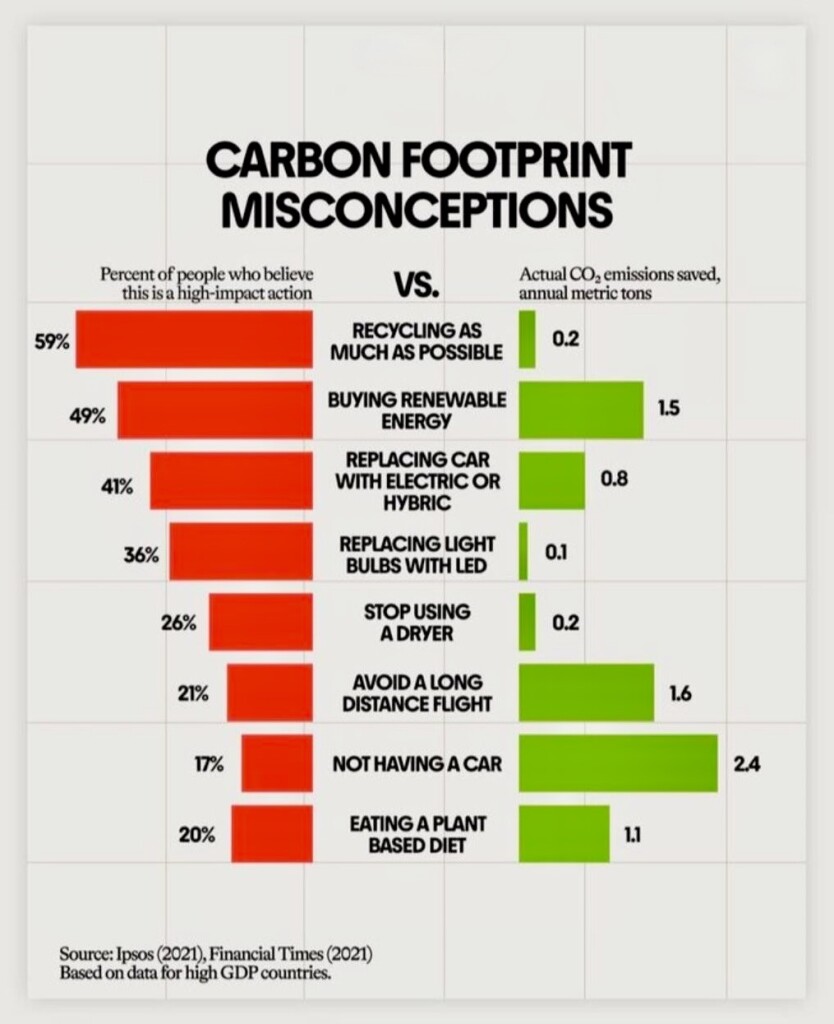Do the right thing.
It may not always be clear at first what the right thing is. For example, recycling is fairly easy but accomplishes much less than something more difficult such as changing your diet or giving up your car.
Learn the differences, and do the right thing. 🤗
#Environment #Climate #ClimateChange #ClimateCrisis #ClimateAction #WarOnCars #BanCars
It may not always be clear at first what the right thing is. For example, recycling is fairly easy but accomplishes much less than something more difficult such as changing your diet or giving up your car.
Learn the differences, and do the right thing. 🤗
#Environment #Climate #ClimateChange #ClimateCrisis #ClimateAction #WarOnCars #BanCars
Ten wpis został zedytowany (2 lata temu)
MiKlo:~/citizen4.eu$💙💛 lubi to.
2 użytkowników udostępniło to dalej


JanPV
•Yes I'm Antifa. Why Aren't U?
•Imagine if just HALF of all domestic air travel were replaced by high speed rail? #ThinkOutsideTheBox #MagLev #Trains #GND #ClimateChange
Richard Knott
•https://www.euronews.com/green/2022/12/02/is-france-banning-private-jets-everything-we-know-from-a-week-of-green-transport-proposals
It's official: France bans short-haul domestic flights in favour of train travel
Lottie Limb (Euronews.com)Pollinators
•King Kaufman
•We can do ALL of these things, and thousands of millionaires and billionaires more than negate our lifetime of work every month or so. I'm guessing a significant number of corporations negate our lifetime of work hourly.
kravietz 🦇
•patrislav ♾️ #RIPNatenom
•molly in missouri
•Blocking advertisements and corporate messaging is the best way to free up mental space; the rest becomes glaringly obvious once you live like that for just a little bit.
molly in missouri
•I noticed i spend less money and feel less longing for products since escaping advertising and promotional 'news.'
The eco benefits add up alongside the improved mental, physical and emotional improvements
Elendol
•Matt Godden
•Mullaney
•We are not going to solve this by making better individual consumer decisions.
ZenXArch
•As for giving up your car. Its easy to say you will do but in practice, it has to be done by government making better zoning laws, walk/bike friendly streets and robust public transportation.
H2O
•Nicovel0 🍉
•craftycat
•Steve Moore :toad:
•4Rs - repair, reuse, repurpose, reconsider (purchases). Everything you buy, & throw away has to be transported. Longer lasting things like LEDs require less transport & reduce waste stream, which requires transport. Consider packaging, compost organics, share/trade things, make something you want/need. Little ways to pull the plug on capitalism. Don't give up
Erwin Ernst eest9 Steinhammer
•Paul Tichonczuk
•Paul Tichonczuk
•Thanks.
Yeah, recycling is weak in terms of impact.
MiKlo:~/citizen4.eu$💙💛
"Not having a car" would have to be extrapolated to "not having a plethora of other consumer goods", the use of which, while not directly generating a carbon footprint, their production and recycling already does. Because effectively the carbon footprint is directly proportional to the income spent on such goods.
André van Schoubroeck
•MiKlo:~/citizen4.eu$💙💛 lubi to.
Clinton Anderson SwordForHire
•That the general population can have ANY positive effect is nothing more than propaganda, bought, paid for, and broadcast by, primarily The Oil & Gas Industry, The Auto Industry....
Dronn
•Mary Hilton
•JustAFrog
•Society isn't willing to vote for it, apparently.
I will pay for that along with everyone else, whether they voted for head-in-the-sand or not.
Steve Bennett
•It's just that the point of recycling isn't primarily about reducing CO2 emissions.
I'd also like to see "not having kids" on that list!
iByteABit
•Supposing that the construction process for electric cars has also been fully migrated to electric in the future
Antanicus
•The Guardian recently ran a series of articles about the global carbon divide and the numbers are staggering: "while the wealthiest 1% tend to live climate-insulated, air-conditioned lives, their emissions – 5.9bn tonnes of CO2 in 2019 – are responsible for immense suffering"
https://www.theguardian.com/us-news/2023/nov/20/first-thing-richest-1-account-for-more-carbon-emissions-than-poorest-66
First Thing: Richest 1% account for more carbon emissions than poorest 66%
Nicola Slawson (The Guardian)Manuel
•This is already happening at a very small magnitude and very slowly.
It all depends on how quickly we want to get there.
Bram Diederik aka daft_dutch
•Love to use my dryer. Buying green energy.
Paul Wermer, CC BY-NC-SA 4.0
•And reducing consumption as a whole is key to addressing climate change and ecosystem health as a whole.
We need a much better sound bite/elevator pitch than "degrowth", which scares many who hear it as a "back to the caves" message.
Tom von Alten
•JohnW
•My best choice was to buy a smaller one and not drive often. (I work from home so I don't need to).
peter
•Haelwenn /элвэн/ :triskell: 🔜fosdem
•Haelwenn /элвэн/ :triskell: 🔜fosdem
•